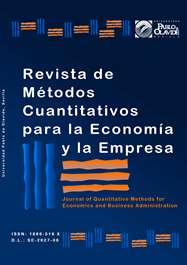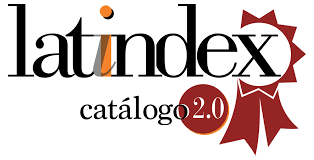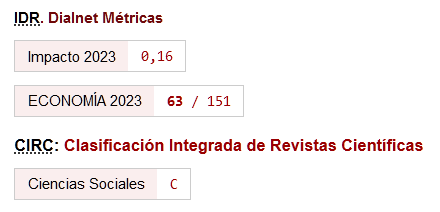Detectando diferencias en la medición de la calidad del resultado: evidencia empírica para empresas españolas
DOI:
https://doi.org/10.46661/revmetodoscuanteconempresa.2178Palabras clave:
Calidad de la información, atributos del resultado, ajustes por devengo discrecionales, calidad de los ajustes por devengo, alisamiento del resultado, test de Friedman.Resumen
La calidad del resultado empresarial no es un concepto medible a través de una única variable, sino que existen diversos atributos que la caracterizan y el uso de uno u otro puede condicionar los resultados de la investigación sin poder considerar que ninguno represente la mejor medida de calidad.
El estudio se aborda midiendo la calidad del resultado a través de una importante recopilación de alternativas utilizadas en la literatura y contrastamos si existen diferencias significativas entre la selección de métodos diferentes para medir un mismo atributo utilizando el test de Friedman.
Con los resultados de este trabajo se demuestra que no solo es determinante el atributo seleccionado para evaluar la calidad del resultado empresarial, sino que, además, las diferentes alternativas de cálculo de cada atributo condicionan los resultados.
De este modo, a través de los resultados obtenidos, podemos afirmar que es una cuestión clave para cualquier trabajo de investigación sobre la calidad del resultado contable, definir y medir de forma apropiada dicho concepto, puesto que los resultados y las conclusiones del trabajo pueden estar determinadas por dicha decisión.
Descargas
Citas
Aboody, D., Hughes, J. y Liu, J. (2005). Earnings quality, insider trading, and cost of capital. Journal of Accounting Research, Vol. 43, Nº 5, pp. 651–673.
Alcarria, J. y Gill de Albornoz, B. (2004). Specification and power of cross-sectional abnormal working capital accruals models in the Spanish context. European Accounting Review, Vol. 13, Nº 1, pp. 73–104.
Aussenegg, W., Inwinkl, P. y Schneider, G.T. (2008). Earnings management and local vs. international accounting standards of european public firms. Working paper: http://www.ssrn.com.
Ayers, B.C., Jiang, J. y Yeung, P.E. (2006). Discretionary Accruals and Earnings Management: An analysis of pseudo earnings targets. Accounting Review, Vol. 81, Nº 3, pp. 617–652.
Ball, R. y Shivakumar, L. (2005). Earnings quality in UK private firms: comparative loss recognition timeliness. Journal of Accounting and Economics, Vol. 39, Nº 1, pp. 83–128.
Bartov, E., Gul, F. y Tsui, J. (2000). Discretionary-accruals models and audit qualifications. Journal of Accounting and Economics, Vol. 30, Nº 3, pp. 421–452.
Barua, A. (2006). Using the FASB's qualitative characteristics in earnings quality measures. Louisiana State University.
Beatty, A., Liao, S. y Weber, J. (2009). Financial reporting quality, private information, monitoring and the lease-versus-buy decision. Working paper, disponible en: http://papers.ssrn.com/sol3/papers.cfm?abstract_id=1499306. Ohio State University.
Bhattacharya, U., Daouk, H. y Welker, M. (2003). The world price of earnings opacity. The Accounting Review, Vol. 78, Nº 3, pp. 641–678.
Biddle, G. y Hilary, G. (2006). Accounting quality and firm-level capital investment. Accounting Review, Vol. 81, Nº 5, pp. 963–982.
Biddle, G., Hilary, G. y Verdi, R. (2009). How does financial reporting quality relate to investment efficiency? Journal of Accounting and Economics, Vol. 48, Nº 2-3, pp. 112–131.
Boonlert-U-Thai, K., Meek, G. y Nabar, S. (2006). Earnings attributes and investor-protection: International evidence. International Journal of Accounting, Vol. 41, Nº 4, pp. 327–357.
Bowen, R., Rajgopal, S. y Venkatachalam, M. (2008). Accounting discretion, corporate governance, and firm performance. Contemporary Accounting Research, Vol. 25, Nº 2, pp. 351–405.
Burgstahler, D., Hail, L. y Leuz, C. (2006). The importance of reporting incentives: Earnings management in European private and public firms. The Accounting Review, Vol. 81, Nº 5, pp. 983–1016.
Callao, S. y Jarne, J.I. (2010). Have IFRS affected earnings management in the European Union? Accounting in Europe, Vol. 7, Nº 2, pp. 209–239.
Chambers, D. (1999). Earnings management and capital market misallocation. Working paper, disponible en: http://papers.ssrn.com/sol3/papers.cfm?abstract_id=198790.
Chen, H., Tang, Q., Jiang, Y. y Lin, Z. (2009). Mandatory IFRS Adoption and Accounting Quality: Evidence from the European Union. Working paper, disponible en: http://papers.ssrn.com/sol3/papers.cfm?abstract_id=1330352.
Cheng, P., Man, P. y Yi, C.H. (2013). The impact of product market competition on earnings quality. Accounting and Finance, 53, 137–162.
Dechow, P. y Dichev, I. (2002). The quality of accruals and earnings: The role of accrual estimation errors. Accounting Review, 77, Supplement, pp. 35–59.
Dechow, P., Ge, W. y Schrand, C. (2010). Understanding earnings quality: A review of the proxies, their determinants and their consequences. Journal of Accounting and Economics, 50, 2-3, pp. 127–466.
Dechow, P., Richardson, S. y Tuna, I. (2003). Why are earnings kinky? An examination of the earnings management explanation. Review of Accounting Studies, Vol. 8, Nº 2, pp. 355–384.
Dechow, P., Sloan, R. y Sweeney, A. (1995). Detecting earnings management. The Accounting Review, Vol. 70, Nº 2, pp. 193–225.
DeFond, M. y Jiambalvo, J. (1994). Debt covenant violation and manipulation of accruals. Journal of Accounting and Economics, Vol. 17, Nº 1-2, pp. 145–176.
DeFond, M. y Park, C. (1997). Smoothing income in anticipation of future earnings. Journal of Accounting and Economics, Vol. 23, Nº 2, pp. 115–139.
DeFond, M. y Subramanyam, K. (1998). Auditor changes and discretionary accruals. Journal of Accounting and Economics, Vol. 25, Nº 1, pp. 35–67.
DeGeorge, F., Ding, Y., Jeanjean, T. y Stolowy, H. (2007). The impact of analyst following on earnings management: Monitoring or consensus fixation? International evidence. Working paper: http://www.iae.univ-poitiers.fr/afc07/Programme/PDF/p102.pdf. Swiss Finance Institute.
Delgado, M. y Castrillo, L. (2001). Detecting earnings management in a Spanish context. Working paper: http://www3.uva.es/empresa/uploads/dt_09_01.pdf.
Doupnik, T. (2008). Influence of culture on earnings management: a note. Abacus, Vol. 44, Nº 3, pp. 317–340.
Ecker, F., Francis, J., Olsson, P. y Schipper, K. (2005). Comparing total and current accruals quality. Working paper: http://faculty.fuqua.duke.edu/~fecker/EFOS_2005.pdf. Duke University.
Francis, J., LaFond, R., Olsson, P. y Schipper, K. (2002). The market pricing of accruals quality. Working paper: http://papers.ssrn.com/sol3/papers.cfm?abstract_id=414140.
Francis, J., LaFond, R., Olsson, P. y Schipper, K. (2004). Costs of equity and earnings attributes. Accounting Review, Vol. 79, Nº 4, pp. 967–1010.
Francis, J., LaFond, R., Olsson, P. y Schipper, K. (2005). The market pricing of accruals quality. Journal of Accounting and Economics, Vol. 39, Nº 2, pp. 295–327.
Francis, J., Nanda, D. y Olsson, P. (2008). Voluntary disclosure, earnings quality, and cost of capital. Journal of Accounting Research, Vol. 46-99, Nº 1, pp. 53–99.
Francis, J., Olsson, P. y Schipper, K. (2006). Earnings Quality, Foundations and Trends in Accounting.
Friedman, M. (1937). The use of ranks to avoid the assumption of normality implicit in the analysis of variance. Journal of the American Statistical Association (American Statistical Association) 32, 200, pp. 675–701.
Gaio, C. (2010). The Relative Importance of Firm and Country Characteristics for Earnings Quality around the World. European Accounting Review, Vol. 19, Nº 4, pp. 693–738.
Gaio, C. y Raposo, C. (2011). Earnings quality and firm valuation: international evidence. Accounting and Finance, 51, pp. 467–499.
García Osma, B. y Gill de Albornoz, B. (2005). Corporate governance and earnings management in Spain. Working paper: http://dfc.gestao.iscte.org/downloads/Gov_EM_BelenNoguer.pdf.
García Osma, B. y Gill de Albornoz, B. (2007). The effect of the board composition and its monitoring committees on earnings management: Evidence from Spain. Corporate Governance: An International Review, Vol. 15, Nº 6, pp. 1413–1428.
García Osma, B. y Pope, P. (2009). Earnings quality effects of mandatory IFRS adoption. Working paper.
Gassen, J. y Sellhorn, T. (2006). Applying IFRS in Germany: determinants and consequences. Working paper, disponible en: http://papers.ssrn.com/sol3/papers.cfm?abstract_id=906802.
Geiger, M.A. y North, D.S. (2006). Does hiring a new CFO change things? An investigation of changes in discretionary accruals. Accounting Review, Vol. 81, Nº 4, pp. 781–809.
Gill-de-Albornoz, B. e Illueca, M. (2005). Earnings management under price regulation: Empirical evidence from the Spanish electricity industry. Energy Economics, Vol. 27, Nº 2, pp. 279–304.
Gill de Albornoz, B. e Illueca, M. (2007). La calidad de los ajustes por devengo no afecta al coste de la deuda de las PYMES españolas. Investigaciones Económicas, Vol. 31, Nº 1, pp. 79–117.
Gisbert, A. (2006). La reacción de los mercados de capitales europeos a las estrategias de publicación del resultado. Revista Española de Financiación y Contabilidad, Vol. 131, Nº Extraordinario, pp. 72–108.
Gordon, E., Jorgensen, B. y Linthicum, C. (2008). Could IFRS Replace US GAAP? A Comparison of Earnings Attributes and Informativeness in the US Market. Working paper, disponible en: http://papers.ssrn.com/sol3/papers.cfm?abstract_id=1132908.
Guidry, F., Leone, A. y Rock, S. (1999). Earnings-based bonus plans and earnings management by business-unit managers. Journal of Accounting and Economics, Vol. 26, Nº 1-3, pp. 113–142.
Gunny, K., Jacob, J. y Jorgensen, B. (2007). Earnings Attributes of Alternate Annual Reporting Periods. Working paper: http://papers.ssrn.com/sol3/papers.cfm?abstract_id=992068.
Hunt, A., Moyer, S. y Shevlin, T. (1997). Earnings volatility, earnings management and equity value. Working paper: http://citeseerx.ist.psu.edu/viewdoc/download?doi=10.1.1.129.8282&rep=rep1&type=pdf. University of Washington.
Jones, J. (1991). Earnings management during import relief investigations. Journal of Accounting Research, Vol. 29, Nº 2, pp. 193–228.
Jones, K., Krishnan, G. y Melendrez, K. (2008). Do models of discretionary accruals detect actual cases of fraudulent and restated earnings? An empirical analysis. Contemporary Accounting Research, Vol. 25, Nº 2, pp. 499–531.
Kasznik, R. (1999). On the association between voluntary disclosure and earnings management. Journal of Accounting Research, Vol. 37, Nº 1, pp. 57–81.
Kothari, S., Leone, A. y Wasley, C. (2005). Performance matched discretionary accrual measures. Journal of Accounting and Economics, Vol. 39, Nº 1, pp. 163–197.
Krishnan, G. y Visvanathan, G. (2007). Was Arthur Andersen different? Further evidence on earnings management by clients of Arthur Andersen. International Journal of Disclosure and Governance, 5, 1, pp. 36–47.
Laksmana, I. y Yang, Y. (2009). Corporate citizenship and earnings attributes. Advances in Accounting, incorporating Advances in International Accounting, Vol. 25, Nº 1, pp. 40–48.
Larcker, D. y Richardson, S. (2004). Fees paid to audit firms, accrual choices, and corporate governance. Journal of Accounting Research, Vol. 42, Nº 3, pp. 625–658.
Larcker, D., Richardson, S. y Tuna, A. (2007). Corporate governance, accounting outcomes, and organizational performance. Accounting Review, Vol. 82, Nº 4, pp. 963–1008.
Leuz, C., Nanda, D. y Wysocki, P. (2003). Earnings management and investor protection: an international comparison. Journal of Financial Economics, Vol. 69, Nº 3, pp. 505–527.
McNichols, M. (2002). Discussion of the quality of accruals and earnings: The role of accrual estimation errors. The Accounting Review, 77, Supplement, pp. 61–69.
Petru, B. (2008). Calidad del resultado en la empresa española: evidencia empírica. Tesis doctoral, Universidad de Extremadura.
Ronen, J. y Yaari, V. (2007). Earnings management: emerging insights in theory, practice, and research, Springer.
Schipper, K. y Vincent, L. (2003). Earnings Quality. Accounting Horizons, 17, Supplement, pp. 97–111.
Scholer, F. (2004). The Quality of Accruals and Earnings and the Market Pricing of Earnings Quality. Working paper: http://www.hha.dk/afl/wp/rep/R_2004_01.pdf. University of Aarhus.
Sivaramakrishnan, S. y Yu, S. (2008). On the Association Between Corporate Governance and Earnings Quality. Working paper: http://papers.ssrn.com/sol3/papers.cfm?abstract_id=1014243.
Su, L., Srinidhi, B. y Gul, F. (2007). Informativeness of Earnings and Accruals: Evidence from Audit Pricing. Working paper: http://www.uic.edu/cba/accounting/Documents/Srinidhi-paper.pdf.
Subramanyam, K. (1996). The pricing of discretionary accruals. Journal of Accounting and Economics, Vol. 22, Nº 1-3, pp. 249–281.
Thomas, J. y Zhang, H. (2002). Value-relevant properties of smoothed earnings. Working paper: http://www.uic.edu/classes/actg/actg315zhang/smoo.pdf. Columbia University, New York.
Van Tendeloo, B. y Vanstraelen, A. (2005). Earnings management under German GAAP versus IFRS. European Accounting Review, Vol. 14, Nº 1, pp. 155–180.
Van Tendeloo, B. y Vanstraelen, A. (2008). Earnings management and audit quality in Europe: Evidence from the private client segment market. European Accounting Review, Vol. 17, Nº 3, pp. 447–469.
Wang, L. (2010). Cross-Listing and the Value of Bonding Under Increased Market Integration. Working paper, disponible en: http://papers.ssrn.com/sol3/papers.cfm?abstract_id=1572105.
Yanmin, P. y Huifang, J. (2011). The measurement of earnings quality of listed companies from manufacturing industry: an empirical study. 2011 International Conference on E-Business and E-Government, ICEE2011 – Proceedings, art. No. 5882251, pp. 3692–3695.
Young, S. (1999). Systematic measurement error in the estimation of discretionary accruals: An evaluation of alternative modelling procedures. Journal of Business Finance & Accounting, Vol. 26, Nº 7-8, pp. 833–862.
Zeghal, D., Chtourou, S.M. y Fourati, Y.M. (2012). The effect of mandatory adoption of IFRS on earnings quality: Evidence from the European Union. Journal of International Accounting Research, 11, 2, pp. 1–25.
Descargas
Publicado
Cómo citar
Número
Sección
Licencia
Derechos de autor 2013 Revista de Métodos Cuantitativos para la Economía y la Empresa

Esta obra está bajo una licencia internacional Creative Commons Atribución-CompartirIgual 4.0.
El envío de un manuscrito a la Revista supone que el trabajo no ha sido publicado anteriormente (excepto en la forma de un abstract o como parte de una tesis), que no está bajo consideración para su publicación en ninguna otra revista o editorial y que, en caso de aceptación, los autores están conforme con la transferencia automática del copyright a la Revista para su publicación y difusión. Los autores retendrán los derechos de autor para usar y compartir su artículo con un uso personal, institucional o con fines docentes; igualmente retiene los derechos de patente, de marca registrada (en caso de que sean aplicables) o derechos morales de autor (incluyendo los datos de investigación).
Los artículos publicados en la Revista están sujetos a la licencia Creative Commons CC-BY-SA de tipo Reconocimiento-CompartirIgual. Se permite el uso comercial de la obra, reconociendo su autoría, y de las posibles obras derivadas, la distribución de las cuales se debe hacer con una licencia igual a la que regula la obra original.
Hasta el volumen 21 se ha estado empleando la versión de licencia CC-BY-SA 3.0 ES y se ha comenzado a usar la versión CC-BY-SA 4.0 desde el volumen 22.











